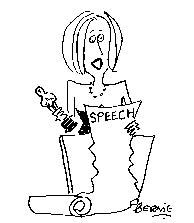Spare a thought for the sons of dictators. Not a nice thought — that would be overkill. Still, spare one all the same. The dictators themselves are somehow easier to understand. Start out as a freedom fighter, get carried away, end up as a murderous tyrant dressed in a beret and a full-body lampshade. Fine. But the sons? What’s going on there?
Saif Gaddafi’s appearance on Libyan TV at the start of the week was something pretty special. Arabic is a language which I suspect we’re culturally programmed to find vaguely intimidating even when it’s being used to whisper a lullaby, but his body language said more than the subtitles. Beyond Scorsese, more the full Mario Puzo.
People talk about David Cameron having an unsettling air of entitlement, but he’s got nothing on Saif. In the eyes, in the pout, in the shrug of the shoulders, you could see a fundamental incomprehension that things could ever not be as they had always been. Not a funny incomprehension. A terrifying one, hardened into a certainty like steel. There he sat, gently threatening Libya, shaking his head at Libya, wagging a finger at Libya, convinced — convinced — that he had the right. And as he did so, coldly menacing a nation, swearing to fight to the last bullet, I found myself thinking: this man has almost certainly watched EastEnders.
Perhaps not habitually, admittedly. But at least once. Of an evening, perhaps, while waiting for the news. Maybe it was on in the background, while he was Skyping that fat, wife-beating brother of his. My point is, Saif lived in Britain for years. He was a student at the LSE. His foods were our foods, his streets were our streets. His television was our television. Obviously it’s possible to live in the midst of our society while simultaneously understanding close to nothing about it (and one should never forget that marvellous diary story about Saif’s mate Prince Andrew, ‘laughing uncontrollably’ the first time he realised pizzas came in boxes) but something, surely, has to percolate in. What does it say about us if it doesn’t?
President Bashar Al-Assad of Syria, he’s another one. For the last 11 years, he’s been the ruler of a totalitarian state which sponsors international terrorism. Before that, he was a trainee ophthalmologist in Marylebone, and married a bird from Acton. Or how about Crown Prince Salman of Bahrain? He was at Cambridge studying philosophy the year before I was. I don’t remember a module specifically devoted to why it probably isn’t ethically sound to let police beat up paramedics, but trust me, such things loomed pretty large in the community vibe. Maybe this is what happens if you don’t go to the bar.
There are others. Many others. The best you can say about most of them is that they go home, start by saying the right things, and end up still doing the same old wrong things. Then, periodically, they come back to London to meet the Queen, visit Harrods, buy up another bit of Knightsbridge, and deny everything. This never used to feel like much of a problem. Suddenly, you wonder why.
You also wonder — or at least I do — how forgiving the free man in the Arab street is ultimately going to be. Is he really going to look to the free West and see us as having been on his side all along? Or is he, in fact, going to see us as the place which befriended his oppressor, welcomed his oppressor’s kids, and sent them home with degrees and platitudes, but somehow little else?
Our former home secretary — best known, poor woman, for the way she claimed for her husband’s pornographic movies on parliamentary expenses — has done a show for Radio 5 on the prevalence of pornography movies on the internet. Jacqui Smith told the Radio Times that she had been ‘shocked’ to discover how much there was floating around for free. Not as shocked as her other half, I’ll bet.
You can see what she’s trying to do, I think. People accused Jeffrey Archer of making up stories, so he went out and made up stories. Jonathan Aitken fell from grace and went to jail, so he emerged as a man who talks movingly about people who go to jail. David Mellor was all over the papers for (fictitiously, I seem to remember) having sex in a Chelsea shirt, so he re-invented himself as a sports pundit. Neil Hamilton was a laughing stock for being a hen-pecked oddball — he made it into a career. Michael Portillo was nasty and didn’t care, so he stopped being nasty and started caring a lot. Tony Blair was loathed for buggering up the Middle East, so he resigned and went to work on quietly making it better.
It’s all about owning the problem. Embrace the stuff that hurt you, make it your own, and it can hurt you no more. Yet, much as I admire Jacqui Smith’s guts in trying, that’s a tough call with porn. I haven’t heard her documentary yet, but all the related media seems to suggest she comes out of it worrying about porn. This is pretty much how she went in. Alas, that’s not owning the story, but continuing it. Frankly, it’s hard to imagine how anybody could win after a porn scandal without it turning into a flight of whimsy from a Rod Liddle column. But let’s not go there.
Hugo Rifkind is a writer for the Times.







Comments